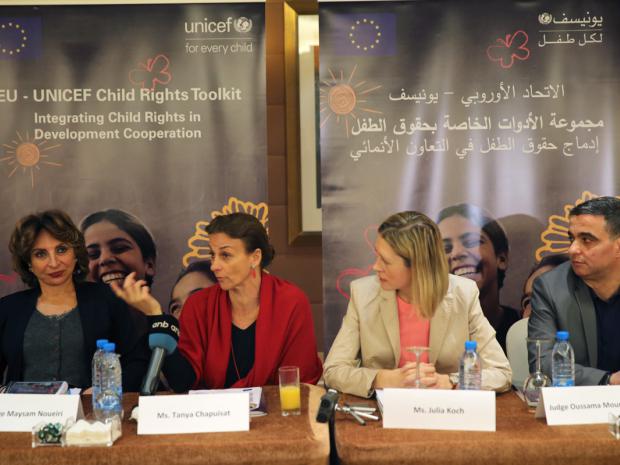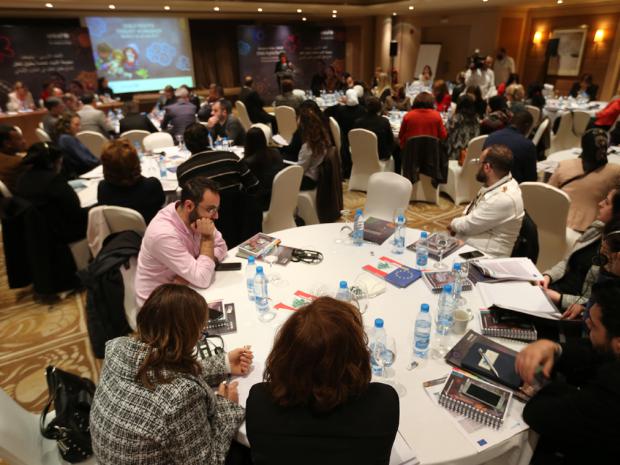Happening in Lebanon : workshop on the Child Rights toolkit organized by the EU Delegation and UNICEF – 22-23 February 2017
Discussion details

Participating to the dissemination and operationalization of the Child Rights Toolkit the Delegation of the European Union in Lebanon (EU) and the United Nations Children's Fund (UNICEF) Beirut office organised in February 2017 a joint workshop "Integrating Child Rights in Development Cooperation in Lebanon". This event was attended by around 80 participants, including senior representatives from the EU, UNICEF, the Ministries of Justice, Labour, Social Affairs, Interior and Municipalities (FSI), Education and Higher Education, the Lebanese Armed Forces, as well as national and international development partners and the media.
The highlight of the opening ceremony, attended by 15 editors, was the launch of the EU-UNICEF Child Rights Toolkit, aimed at integrating child rights in development cooperation. The toolkit had just recently been translated into Arabic. It was presented for the first time in the MENA region. The launch was followed by a successful interactive press briefing with key speakers from EU, UNICEF and the Government of Lebanon.
The Child Rights Toolkit was developed with support from the European Union to address the needs of national decision-makers and practitioners in realising children’s rights when elaborating programmes and policies across all aid modalities and all sectors of development cooperation. Julia Koch de Biolley, Deputy Head of Mission at the Delegation of the European Union to Lebanon said: “Over the past decade Lebanon has been taking positive steps to promote children's rights and protection. Although progress has been achieved there are still factors that hinder the complete observance of children’s rights. (…) This toolkit will help integrate children's rights in development cooperation. It will be the go-to document when programmes and policies are being elaborated to give children the support and protection they need.” UNICEF’s representative in Lebanon, Tanya Chapuisat, said: “Our efforts to promote the rights of children will only make sense if we are able to translate these rights and standards into tangible steps and approaches. This is what the toolkit aims for: providing guidance for national decision makers to make informed and practical strategic decisions that will have a positive impact on the lives of all children in Lebanon."
The two-day workshop first focused on main child rights concepts and their implementation in policies and programmes in key sectors in Lebanon – from public finance to agriculture. It then provided specific highlights on child protection systems strengthening and more particularly on justice for children, to which the second day of the workshop was fully dedicated.
Thanks to its interdisciplinary and interactive approach, combining creative exercises and information for practitioners with content-rich and tailor-made sessions on how to implement a rights based approach for children, the two-day workshop provided participants with plenty of opportunities to exchange and created a platform for dialogue, centred around child rights and justice for children in Lebanon.
Participants were notably offered the opportunity to work on contextualised case studies related to child labour in the agriculture sector, child marriage, children affected by armed conflict, children living and working in the street, children in conflict with the law, and children in budgeting/decentralisation policies. The different background of participants enabled enriched discussions to take place, highlighting the complementary role that each stakeholder can play, with different tools and at different levels. Moreover, throughout these two days, professional perspectives of the child protection and justice systems in Lebanon re-contextualised and enlightened the debate.
Ultimately, the workshop triggered an enriched multipartite dialogue and fostered genuine political commitment among key stakeholders for a shared national agenda around child rights and justice for children in Lebanon. Key priority interventions were developed and presented by participants, which provided an extremely valuable basis on which the EU Delegation and UNICEF will be able to build in order to move forward with their programming in the area of justice for children in Lebanon.
The two-day workshop ended with the delivery of certificates to all participants, who eventually all turned into child rights champions within their own institutions and within Lebanon!

Log in with your EU Login account to post or comment on the platform.